by digilearn | Aug 4, 2014 | General
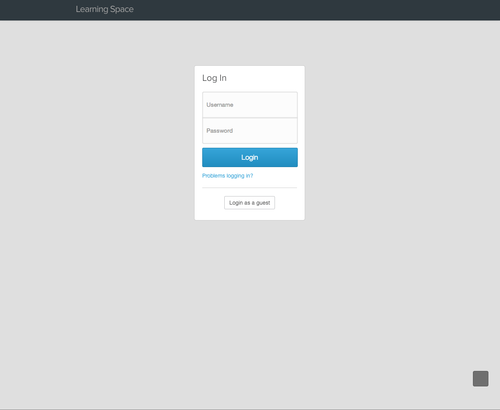
It’s that time of year again. Student data from the last year such as assignments and forum posts are being archived off to allow modules to be populated with data from incoming cohorts. In addition, undergraduates wil be unsubscribed from last year’s modules.
In line with Falmouth University policy, all assessment data will still be available to you via the Academic Administration Team (AAT), but learning space courses will be refreshed for the start of the autumn term.
There will be some essential maintenance time on Tuesday the 5th August between 8AM and 12PM, whilst the team carry out this work.
by digilearn | Jul 22, 2014 | General
As part of the summer of office moves and a refresh for us, Educational Technology have relocated to Cottage 8, Tremough Barton. Here’s a video of the walk from the old office to the new.

(thanks to @tomreadings for the idea)
If you fancy a pleasant stroll, we’d warmly welcome you over for a cup of tea and a catch up.
by digilearn | Jun 20, 2014 | General
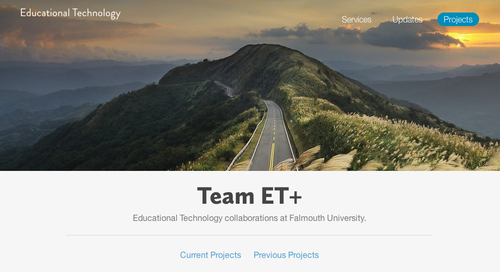
Part of our function is working in collaboration with our academic departments to support appropriate use and research of technology in learning and teaching. Some of these projects might prove beneficial to and benefit from the input of other team and individuals.
When these projects are in review, the questions we often return to are “How do we share these great and innovative practices within the institution?” and “How can we get other people involved?”
The recent staff survey reported that “70% of respondents say, on the whole, the different parts of the University do not communicate effectively with each other”
So as a response to these questions and concerns, let us introduce you to TeamET+
Team ET+ documents our current and past collaborations within and external to Falmouth University. With a simple breakdown of the What, Why, Who, When and Where of each project accompanied by relevant multimedia and documents, we aim to make it easy to understand who to talk to and how to get involved with our collaborative work.
If you’re working on a learning or teaching project that might benefit from advice and support in using technology get in contact.
TeamET+You
by digilearn | Jun 16, 2014 | General
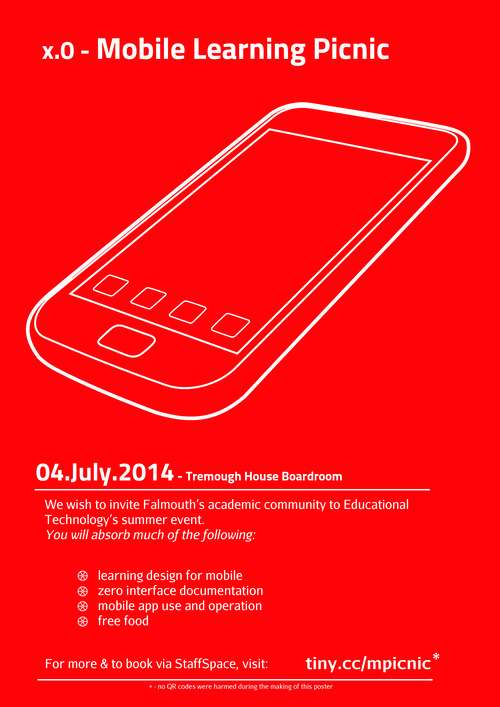
For those staff that are on campus in July, Educational Technology are hosting a picnic themed around making use of mobile devices to support learning and teaching . From 11am on Friday 4th July, come and chat to the team and enjoy a sandwich or two in the sunshine. For more and to book visit staffspace
by Amy Sampson | Jun 16, 2014 | General
This month Educational Technology presented at the annual HEA Arts and Humanities Conference held in Salford, Manchester. The conference was a great place to meet and debate with fellow colleagues working within higher education. Our accepted presentation focused on the personal side of technology adoption using the conference theme of heroes and monsters to portray different approaches. For a full review of the conference click read more below.
The 2014 HEA Arts and Humanities conference kicked off with an insightful keynote from Marian McCarthy which explored immersive aspects of drama and performance in learning and teaching. Marian’s presentation made several references to works of Maxine Greene including “Art and imagination” which speaks about the power of the arts and humanities to push boundaries. The immersive nature of performance was discussed amongst delegates with reference to Howard Gardner’s Multiple Intelligences theory.
“Learning is about attention, practice, refinement and the process is never complete” echoed McCarthy, “It takes us 30 or 40 years to even begin to know. Then we expect students to learn a thing in 30 or 40 minutes”. Marian’s approach and enthusiasm for immersive practice was really refreshing and seems a million miles away from the prescriptive exams that Michael Gove is proposing for creative subjects in secondary schools. “The root of the word assessment means to sit beside the students” states McCarthy, so why then is so much emphasis placed on marks and grades, she continued “The role of the arts is to awaken the imagination, not improve” and I would have to agree. This presentation was a really fitting way to start a conference that focuses on the arts and humanities.
This years conference was held at the Lowry in Salford which formed an impressive backdrop to a thoroughly engaging conference. In between sessions delegates were invited to explore the vast gallery spaces which featured many original works from Lowry himself in addition to portraits by Jonathan Yeo as part of a special exhibition.
Day two started with a second keynote delivered by Jesse Stommel from the University of Wisconsin-Madison. The presentation was titled “Zombie pedagogies: embodied learning in the digital age” and questioned if we can have a digital embodied experience, some in the audience counted this question by asking can we ever not have a embodied digital experience.
This session prompted me to reflect on a publication by Clifford Nass titled “The Man Who Lied to His Laptop” which reviews our interactions with computers and how we as individuals can humanise machines. At one point Jessie referred to his personal technologies as critters which live on him, but are our technologies more ingrained than that? Are they an extension of ourselves and our identity? I did find this session did what it said on the tin, come question time delegates were giving examples of students disruptively using technology to check their Facebook accounts and googling in the lesson. I couldn’t help but wonder why this was so heavily being perceived as a bad thing, students utilise their technology regardless, shouldn’t we therefore be including these means into lessons rather than fight against their inevitable use? I’m not stating that technology isn’t ever disruptive, but maybe the question should be how can we frame such technologies so they can be used to enhance educational experiences rather than hinder? I thoroughly enjoyed this key note as it addressed experiences which blended the digital and the arts/humanities. Jessie is also director and founder of online journal Hybrid Pedagogy, where more discussions around these and similar issues can be found.
The next part of the morning involved a series a smaller break out sessions. For the first session I attended a workshop hosted by Manchester Met University which explored their “My digital life Manchester” research project. This project focuses on architecture students and their relationships to digital technologies. We were encouraged to add to this discussion by completing questions presented through Nearpod and Kahoot! in relation to our own experiences of digital technologies. What did resonate from this session was the vast differences in individual use of technology, some individuals were on devices for two hours as soon as they woke while others resisted any form of technology and preferred traditional architecture methods. Technology use really does come down to individual preferences.
After lunch I presented a session on behalf of Educational Technology which highlighted how personal approaches to technology implementation and support can encourage adoption. Better relationships with teaching and support staff has been achieved since the move project and we now spend a lot less time sending emails; instead opting to phone or visit staff in person. During the session I demonstrated two very different approaches to technology implementation, afterwards I asked delegates to personify these approaches by drawing them as characters, either heroic or monstrous. At the end of the session we compared the two characters drawn as part of the session, the personal approach in all the drawn characters was far more heroic and less monstrous, something I was very relieved to see. As part of the session I took a Doxie in order to capture the characters. I’ve included some of the characters below.
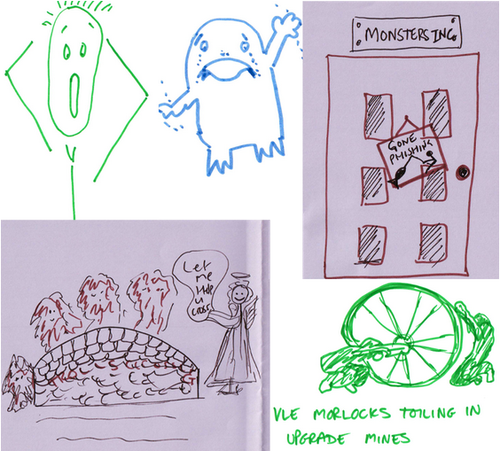
Presentations from University of Ulster and the Glasgow School of Art were also included as part of the afternoon session. Both tackled issues of engagement with technology to support learning and teaching. Vic Boyd from Glasgow School of Art asked how we can balance aesthetics, functionality and student engagement in art and design blended education. This presentation included particular reference to social media platforms and the VLE; using the interchangeable analogy of beauty and the beast to describe them both depending on the situation. This presentation reinforced that so much depends on context as to how these technologies can be applied and therefore successfully used.
The next part of the day revolved around “TEDish talks” from three presenters. These short 10 minute sessions followed the popular TED format in their delivery. The first session was presented by Roger Luckhurst from University of London and was titled “Tentacular Pedagogy”; there followed the most surreal 600 seconds of the conference. Tentacles followed krakens, cephalopods and sea creatures with a bit of Alien and Prometheus thrown in for good measure. New kinds of pedagogies likened to tentacles were championed and described as disembodied, yet intimate. Rogers presentation was unusual and captured the delegates imaginations, who knew so many tentacle references existed.
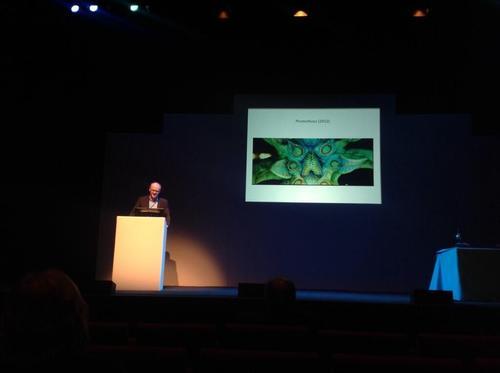
Patricia MacCormack from Anglia Ruskin University gave a 10 minute presentation on Teratological teaching followed by Charlotte Bosseaux from University of Edinburgh. Charlotte’s presentation, Liminal teaching: translating the vampire, focused on translation studies and the interpretation of meanings. To add a monstrous twist Spike from Buffy the Vampire Slayer was utilised as a translation case study for this presentation.
The final day of the conference commenced with further parallel sessions. “Shapeshifters and monster mash-ups” presented by University of Northampton reviewed curriculum changes particularly how to make modules and content more industry facing for graduates hoping to gain employment in their chosen fields, in this case television and film. The next presentation in this session was delivered by Norwich University of the Arts and was titled “Is a long time getting shorter?”. Jill Rodgers is a senior lecturer in Textiles at the University, during the session Jill discussed whether traditional skills can be developed by students in a world where fast moving digital based courses aiming to replicate industry are more common. Deadlines are often shorter with multiple projects running at the same time across platforms, meaning students are finding it increasingly difficult to engage with techniques which require a larger investment in time to develop skills. Mihaly Csikszentmihalyi work on the theory of flow was highlighted as part of this session, he describes how flow is the secret to happiness. Previous Norwich graduate Avila Leigh is part of a slow makers group based in the city, she champions ‘slow making’ within her work. Carl Honoré’s book In Praise of Slow was also recommended as a good resource when discussing ideas around this area, it’s currently sat on my desk waiting to be read!
The final presentation from this session was delivered by London Metropolitan University and was titled “Stop these aliens!” and addressed Stan Cohen’s notion of moral panic and applied this to journalism students studying at the institution.
The second set of parallel sessions featured a session delivered by Annamarie McKie from University of the Creative Arts which investigated the NNS survey through the eyes of Captain Cat. This session resonated with the delegates in the room, and we were afforded the opportunity to discuss our experiences of the survey within our own professional contexts. This presentation followed on from UCA’s “What’s behind the NSS” research project and proved to be very popular with all in the room who had a few words to say about the NSS process as a whole.
The final presentation from this strand was titled “Autonomous learning in the studio: balancing great expectations in hard times” and followed on nicely from the previous paper but used KIS data as a focus. Students and staff from Teeside University were at the session to discuss student expectations in particular relation to value for money, employment prospects and contact time with the course team. One of the delegates made a great comparison between gym membership and tuition fees; joining a gym doesn’t automatically guarantee weight loss and fitness in the same way that completing a degree won’t guarantee you a career in a chosen field.
The HEA conference provided an engaging space for attending delegates to debate issues specifically related to the arts and humanities, and I was pleasantly surprised to discover how much technology played a part in these conversations. Debates between delegates proved to be as interesting as the sessions themselves, I’ve come back to Falmouth with a host of information and further reading plus I’ve met some great individuals working within higher education arts institutions.
by digilearn | May 8, 2014 | General
Over the last few months ET have been working with Jarno Tolonen (Education Technology Services) from Tampere University of Applied Sciences, on a paper for submission to this year’s EdMedia conference.

EdMedia is a world conference on Educational Media and Technology and annually attracts over 1,500 delegates.
The joint submission focuses on changing roles of learners and teachers and is titled ‘Empowering the Learning Event – New Roles for Learning and Teaching’.
The conference is due to be held in Finland at the end of June.
by digilearn | Apr 14, 2014 | General
Facilitated by Educational Technology and Staff Development, x.0 is a monthly, ongoing series of bite sized presentations and workshops for staff and researchers around Educational Technology and best practice within and external to Falmouth University.
Taking place at 11am on the first Friday of the month on alternate campuses, the location of x.0 will be advertised by Staff Development through iTrent and refreshments will be provided for those attending.
x.0 is concerned with future iterations of things. Discussing where we’re at and where we might be going. Anyone with an interest in technology is welcome to attend, but this will also take the form of an open platform for people to present and discuss technology initiatives in Learning and Teaching both at Falmouth and more widely in Cornwall.
Take a look on staffspace and keep an eye on #xpointzero on Twitter to find out more and get involved.
by digilearn | Mar 26, 2014 | General
We understand a lot of you have had issues dragging and dropping your sections around over the past few months. This update has solved this issue to ensure your sections no longer get muddled up.
If you still experience issues please email us at etsupport@falmouth.ac.uk






